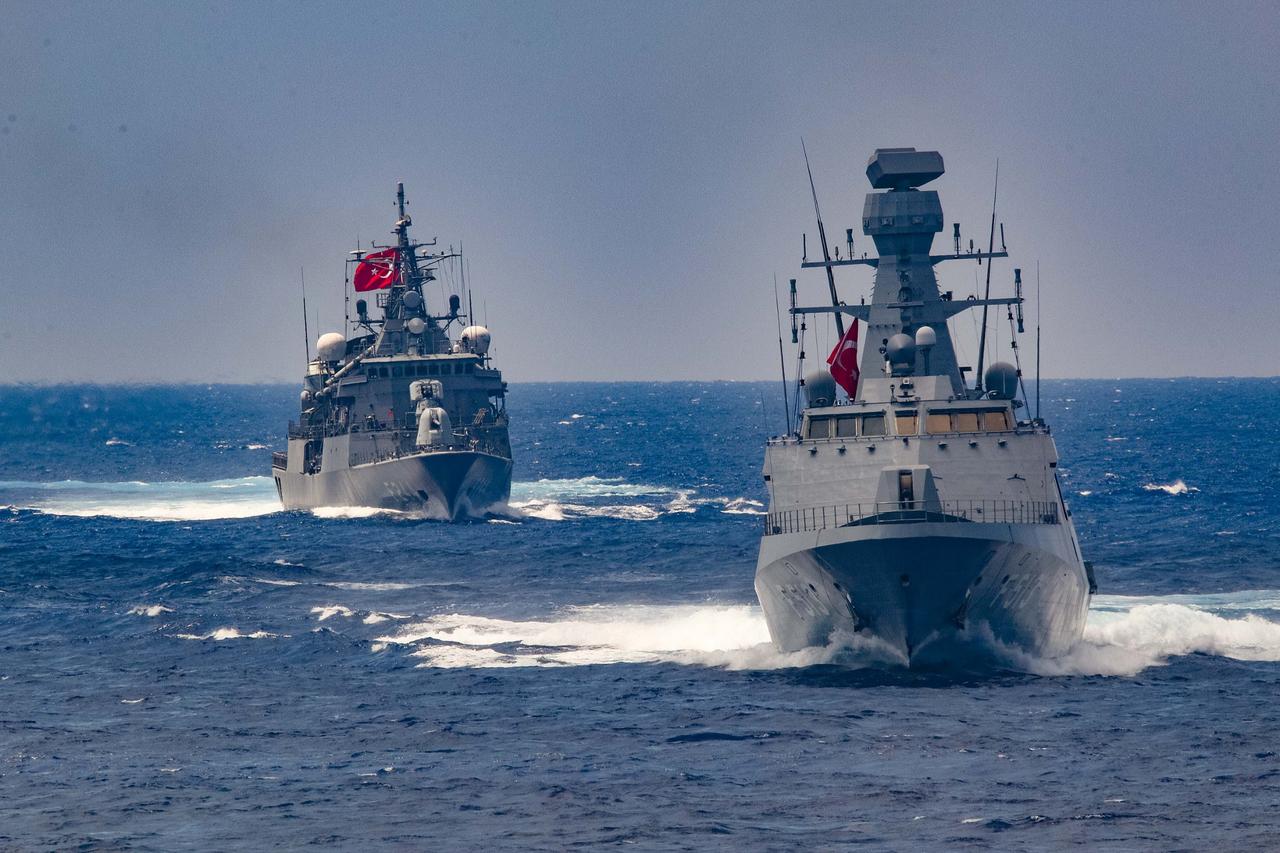
On Sept. 8, 2025, Egypt submitted a “note verbale” to the U.N. formally rejecting a memorandum of understanding (MoU) signed in June 2025 between Libya's National Oil Corporation and the Turkish Petroleum Corporation (TPAO).
The agreement allows for seismic surveys in a maritime zone designated as "Area 4," which Cairo claims overlaps with its own exclusive economic zone (EEZ), territorial sea and contiguous zone.
However, this action cannot be viewed in isolation. It followed a similar “note verbale” from Libya to the U.N. just months earlier, on May 27, 2025, which accused Greece of violating its maritime rights by tendering exploration blocks in an area south of Crete that Libya claims as its own.
This tit-for-tat diplomacy highlights that the contest for resources and influence in the region is a multi-sided affair, not a simple bilateral confrontation. More importantly, it exposes a fundamental inconsistency in how different parties interpret the legal weight of diplomatic protests.
If Egypt's note verbale against Libya carries significant legal and political weight—as Greek and Israeli commentators suggest—then Libya's earlier note verbale against Greece should logically hold the same value, since both are identical diplomatic instruments addressing similar maritime boundary disputes.
Greek and Israeli media's celebrations of Egypt's diplomatic note reveal three critical oversights that fundamentally mischaracterize the situation.
First, these commentators deliberately disregarded the chronological context—Egypt's note came after Libya's similar protest against Greece.
The selective application of diplomatic legitimacy undermines their own argument about the power of such formal protests.
Second, and perhaps more significantly, they ignored a crucial paragraph in Egypt's note verbale that signals a defensive rather than escalatory stance, explicitly calling for dialogue and negotiated solutions.
This diplomatic language stands in stark contrast to Greece's increasingly destabilizing and confrontational approach in the Eastern Mediterranean, suggesting that Cairo seeks de-escalation rather than the formation of an anti-Turkish bloc.
Third, the current dispute between Egypt and Libya is entirely of Cairo's own making, a fact that fundamentally alters the moral and legal landscape of the conflict.
The current maritime dispute between Egypt and Libya stems from a controversial decision made by President Abdel Fattah El-Sisi in December 2022.
Without any prior complaints, demands, or established conflict, Sisi issued Presidential Decree No. 595/2022, unilaterally demarcating Egypt's western maritime borders and effectively seizing thousands of square kilometers of Libya's maritime zone.
This move was taken without consultation or negotiation with any Libyan party, raising serious questions about its timing, justifications, and underlying motivations.
The decision appears to have been driven by two interconnected factors. First, Egypt lost its bet on the military-backed campaign in Libya led by General Khalifa Haftar, which ultimately failed to secure control over the country's western regions and internationally recognized government.
Second, Egypt faced increasing financial pressure after Saudi Arabia and the UAE implemented new, more stringent financial rules for their engagement with Cairo, effectively reducing the unconditional aid that had previously sustained the Egyptian economy.
The Egyptian government's justification for the decree cited the United Nations Convention on the Law of the Sea (UNCLOS).
However, Cairo's conscious unilateral decision to demarcate maritime borders without consulting Libya, and in complete disregard of Libyan interests, directly contradicts UNCLOS principles, which emphasize good faith negotiations and mutual agreement in boundary delimitation.
Perhaps most tellingly, Egypt's maritime seizure created a rare moment of unity across Libya's fractured political landscape.
This is not merely a dispute between Cairo and Libya's internationally recognized Government of National Unity in Tripoli—it involves all Libyans.
Even Egypt's longtime allies in eastern Libya, including General Khalifa Haftar and the House of Representatives headed by Aguila Saleh, categorically rejected Cairo's move, considering it a violation of Libya's sovereignty and national interests.
This internal Libyan consensus against Egypt's unilateralism is a crucial context for understanding the region's shifting alliances and the potential counterproductive effects of Cairo's recent diplomatic move.
The Greek and Israeli celebration of Egypt's note verbale as evidence of a revived anti-Turkish coalition fundamentally misunderstands the transformed geopolitical dynamic of the Eastern Mediterranean.
Until 2021, Greece had successfully leveraged an anti-Türkiye coalition comprising Cyprus, Israel, Egypt, France, and Gulf states, including the UAE and Saudi Arabia. This alliance was built on shared ideological motives to counter and isolate Ankara and prevent it from utilizing its rights in the Eastern Mediterranean.
However, this coalition has effectively collapsed following several key developments. The defeat of Haftar's forces in Libya removed a crucial anti-Turkish proxy, while the Al-Ula Agreement in January 2021 resolved the GCC crisis and enabled Gulf states to normalize relations with Türkiye.
This regional détente was followed by significant improvements in Türkiye-Egypt and Türkiye-UAE bilateral relations, which was followed by the defeat of the Assad regime in Syria, leaving Greece increasingly isolated in its confrontational stance.
The transformation is perhaps most dramatically illustrated by the recent rapprochement between Türkiye and the very eastern Libyan forces it once fought against.

According to Bloomberg, the eastern-based Libyan parliament is now expected to vote on ratifying the landmark 2019 maritime and energy exploration agreement with Türkiye—the very deal it once vehemently opposed.
This stunning reversal in eastern Libya's position toward Türkiye represents one of the most significant geopolitical shifts in the region. The change follows a carefully orchestrated diplomatic campaign that included several high-level engagements throughout 2025.
In April 2025, Saddam Haftar, son of General Khalifa Haftar, met with Türkiye's defense minister and army chief in Ankara, signaling a potential thaw in relations.
This was followed by the inaugural visit of the Turkish navy corvette TCG Kinaliada to the port of Benghazi in August 2025, marking the first time a Turkish warship had docked in eastern Libya since the civil war began.
The diplomatic breakthrough culminated in a surprise visit by İbrahim Kalın, head of Türkiye's National Intelligence Organization (MIT), to Benghazi, where he met directly with Khalifa Haftar.
The meeting aimed to promote Libyan unity, reinforce the Turkish-Libyan memorandum on the Eastern Mediterranean, and focus on areas of mutual interest.
These developments represent a dramatic shift in the nature of Türkiye's relationship with eastern Libya, transforming former adversaries into potential partners and fundamentally altering the strategic balance in the region.
Adding another layer of complexity to the regional dynamics, Türkiye has been engaged in negotiations with Syria to delineate maritime boundaries in the Eastern Mediterranean.
Foreign Minister Hakan Fidan confirmed in July 2025 that work on demarcating maritime boundaries with Syria is underway, rejecting claims that Türkiye had pledged not to pursue such an agreement.
A potential Türkiye-Syria maritime delimitation agreement would further consolidate Turkish influence in the Eastern Mediterranean and create additional pressure on Greece and Cyprus.
Given that the Syrian coast is close to Cyprus, such an agreement could significantly impact the maritime claims of Cyprus and Greece and further isolate Athens’ position.
Accordingly, the celebration of Egypt's note verbale by Greek and Israeli media appears to be a fundamental misreading of the strategic situation. Rather than signaling the revival of an anti-Turkish coalition, current developments suggest several troubling trends for Greece:
First, Egypt's note verbale is unlikely to create a rift between Cairo and Ankara at this moment.
If anything, it might prove counterproductive for Egypt, as it could push Cairo's former allies in eastern Libya—where Egypt seized thousands of square kilometers of maritime territory—further toward Türkiye.
Second, Greece's efforts to revive an anti-Turkish coalition in the Eastern Mediterranean, with the help of Cyprus and Israel, are likely to fail again given the transformed regional dynamics and the normalization of relations between Türkiye and key regional powers.
Third, Greece faces an increasingly unfavorable strategic position as Türkiye successfully builds new partnerships and potentially secures additional maritime agreements.
The prospect of a Türkiye-Syria delimitation agreement, combined with the likely approval of the Turkish-Libyan agreement by Libya's eastern parliament, would leave Greece in an even more disadvantageous position.
Rather than hoping for the revival of a defunct coalition, Greece's most viable path forward lies in direct and pragmatic negotiations with both Türkiye and Libya.
The window for securing a mutually acceptable delimitation agreement is narrowing, and Greece still has an opportunity to resolve its problems with Türkiye before finding itself in an even more unfavorable position following potential delimitation agreements between Türkiye and Syria, and the likely approval of the Libyan parliament for the 2019 Turkish-Libyan delimitation agreement.
The Eastern Mediterranean's future will be shaped not by the resurrection of old alliances, but by the pragmatic recognition of new realities and the willingness to engage in good-faith negotiations.
For Greece, the choice is clear: adapt to the changing geopolitical landscape or risk further strategic marginalization.